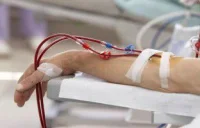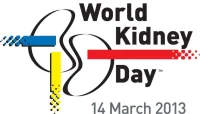Image: Drs. Marie-Josée Hébert, Mélanie Dieudé and Héloïse Cardinal (Credit: CRCHUM)
A team led by Dr. Marie-Josée Hébert from the University of Montreal Hospital Research Centre (CRCHUM) has discovered a new cause of organ rejection in some kidney transplant patients. Her team has identified a new class of antibodies – anti-LG3 – which when activated lead to severe rejection episodes associated with a high rate of organ loss. This discovery, which holds promise for organ recipients, was published in the online version of the American Journal of Transplantation.
Rejection is one of the major obstacles to organ transplantation. For the most part, it occurs when the recipient’s immune system recognizes the transplanted organ as a foreign body that must be eliminated. However, even when there is a good donor-recipient immunologic match, the recipient’s immune system can attack the transplanted organ’s blood vessels. Called acute vascular rejection, this phenomenon often leads to a high rate of graft loss.
Hébert’s team has characterized anti-LG3, an antibody that some patients produce to attack LG3, a protein that plays an important role in vascular repair and regeneration. “In these patients, the secretion of LG3 by the new kidney stimulates the activity of these antibodies which attack and injure the blood vessels of the transplanted organ. The net effect is that the normal healing process of the transplanted organ is hindered, if not interrupted, leading to impaired kidney function and even loss,” explains Dr. Hébert.
By identifying the heightened presence of anti-LG3 antibodies in patients prior to transplantation, researchers will be able to predict the development of severe rejection episodes. “These results are quite exciting,” notes Hébert, “and suggest that new therapies aimed at eliminating LG3 antibodies prior to transplantation could reduce organ rejection or limit its severity.”
Given that LG3 is present in all blood vessels and thus in all transplanted organs, Hébert’s results could also explain rejection of other types of transplanted organ, such as the heart, lung and pancreas.
To view the study : http://www.ncbi.nlm.nih.gov/pubmed/23432943
Source: CRCHUM
A team led by Dr. Marie-Josée Hébert from the University of Montreal Hospital Research Centre (CRCHUM) has discovered a new cause of organ rejection in some kidney transplant patients. Her team has identified a new class of antibodies – anti-LG3 – which when activated lead to severe rejection episodes associated with a high rate of organ loss. This discovery, which holds promise for organ recipients, was published in the online version of the American Journal of Transplantation.
Rejection is one of the major obstacles to organ transplantation. For the most part, it occurs when the recipient’s immune system recognizes the transplanted organ as a foreign body that must be eliminated. However, even when there is a good donor-recipient immunologic match, the recipient’s immune system can attack the transplanted organ’s blood vessels. Called acute vascular rejection, this phenomenon often leads to a high rate of graft loss.
Hébert’s team has characterized anti-LG3, an antibody that some patients produce to attack LG3, a protein that plays an important role in vascular repair and regeneration. “In these patients, the secretion of LG3 by the new kidney stimulates the activity of these antibodies which attack and injure the blood vessels of the transplanted organ. The net effect is that the normal healing process of the transplanted organ is hindered, if not interrupted, leading to impaired kidney function and even loss,” explains Dr. Hébert.
By identifying the heightened presence of anti-LG3 antibodies in patients prior to transplantation, researchers will be able to predict the development of severe rejection episodes. “These results are quite exciting,” notes Hébert, “and suggest that new therapies aimed at eliminating LG3 antibodies prior to transplantation could reduce organ rejection or limit its severity.”
Given that LG3 is present in all blood vessels and thus in all transplanted organs, Hébert’s results could also explain rejection of other types of transplanted organ, such as the heart, lung and pancreas.
To view the study : http://www.ncbi.nlm.nih.gov/pubmed/23432943
Source: CRCHUM
Latest Articles
kidney, transplantation
Image: Drs. Marie-Josée Hébert, Mélanie Dieudé and Héloïse Cardinal (Credit: CRCHUM) A team led by Dr. Marie-Josée Hébert from the University of M...










